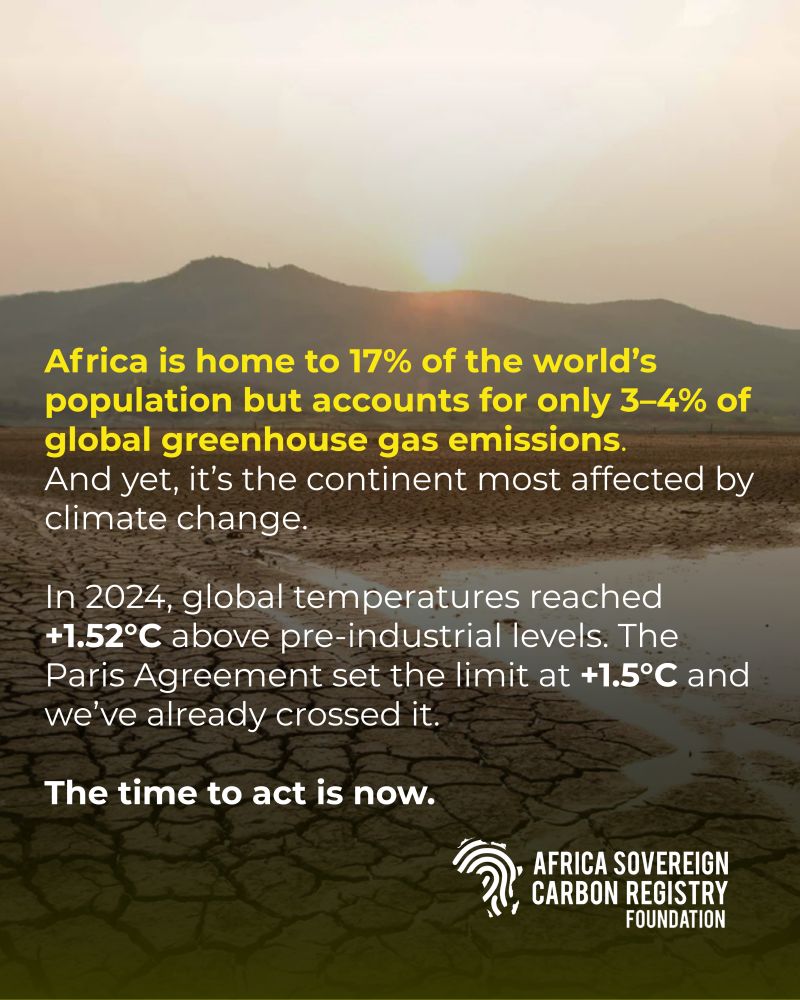
Surpassing the +1.5°C limit set by the Paris Agreement marks a historic rupture: climate change is no longer a future projection but a lived reality. In Africa, prolonged droughts, food insecurity, population displacement, and ecosystem collapse are intensifying, even though the continent is responsible for only a tiny fraction of historical emissions. This reality calls us back to a fundamental principle: climate justice is built on equity and the polluter-pays principle.
By mid-2025, only three African countries, Somalia, Zambia, and Zimbabwe, had submitted updated Nationally Determined Contributions (NDCs) ahead of COP30. This limited engagement does not reflect a lack of political will, but structural constraints: limited access to climate finance, unstable funding flows, growing debt, and the absence of suitable mechanisms to recognize and reward national climate efforts in a context marked by a deepening economic and environmental recession.
This is where 𝐜𝐥𝐢𝐦𝐚𝐭𝐞 𝐬𝐨𝐯𝐞𝐫𝐞𝐢𝐠𝐧𝐭𝐲 becomes essential. Africa can neither rely on existing carbon markets nor bear the cost of its transition alone. It needs 𝐬𝐭𝐫𝐮𝐜𝐭𝐮𝐫𝐚𝐥 𝐭𝐨𝐨𝐥𝐬, 𝐝𝐚𝐭𝐚 𝐬𝐨𝐯𝐞𝐫𝐞𝐢𝐠𝐧𝐭𝐲, 𝐚𝐧𝐝 𝐩𝐨𝐥𝐢𝐭𝐢𝐜𝐚𝐥 𝐥𝐞𝐯𝐞𝐫𝐬 𝐭𝐚𝐢𝐥𝐨𝐫𝐞𝐝 𝐭𝐨 𝐢𝐭𝐬 𝐨𝐰𝐧 𝐩𝐫𝐢𝐨𝐫𝐢𝐭𝐢𝐞𝐬.
Article 6.8 of the Paris Agreement offers a path forward, a non-market approach rooted in territorial realities, enabling countries to move away from speculative mechanisms and design just, durable, and locally led solutions. This is the core of Sovereign Carbon Initiatives: tools that allow countries not to submit to the rules of the game, but to define them.
As we approach the African Climate Summit (8–10 September 2025), the continent must put forward a clear strategic vision:
➡️ position Article 6.8 as a pillar of fair climate action
➡️ build a pan-African governance framework for climate sovereignty, based on national registries
➡️ and call for commitments proportionate to the historical responsibilities of major emitters
𝐂𝐥𝐢𝐦𝐚𝐭𝐞 𝐬𝐨𝐯𝐞𝐫𝐞𝐢𝐠𝐧𝐭𝐲 𝐢𝐬 𝐧𝐨𝐭 𝐚 𝐬𝐥𝐨𝐠𝐚𝐧. 𝐈𝐭 𝐢𝐬 𝐚 𝐟𝐫𝐚𝐦𝐞𝐰𝐨𝐫𝐤, 𝐚𝐧𝐝 𝐭𝐨𝐝𝐚𝐲, 𝐭𝐡𝐞 𝐦𝐨𝐬𝐭 𝐜𝐫𝐞𝐝𝐢𝐛𝐥𝐞 𝐭𝐨𝐨𝐥 𝐭𝐨 𝐚𝐜𝐜𝐞𝐥𝐞𝐫𝐚𝐭𝐞 𝐚𝐝𝐚𝐩𝐭𝐚𝐭𝐢𝐨𝐧, 𝐫𝐞𝐬𝐭𝐨𝐫𝐞 𝐜𝐥𝐢𝐦𝐚𝐭𝐞 𝐣𝐮𝐬𝐭𝐢𝐜𝐞, 𝐚𝐧𝐝 𝐟𝐢𝐧𝐚𝐧𝐜𝐞 𝐫𝐞𝐚𝐥 𝐬𝐨𝐥𝐮𝐭𝐢𝐨𝐧𝐬 𝐚𝐭 𝐭𝐡𝐞 𝐫𝐢𝐠𝐡𝐭 𝐬𝐜𝐚𝐥𝐞.
Read the full study:
🔗 https://lnkd.in/gGJH7vac
